

How Do You Say BON VOYAGE in Italian?
Is someone you know going on a trip? Perhaps even to Italy? Say buon viaggio to wish them bon voyage in Italian!
Table of Contents
BON VOYAGE AND BUON VIAGGIO
Buon viaggio means have a good trip or have a good journey in Italian, just like bon voyage does in French. Buon means good in Italian, and viaggio means trip or journey , so buon viaggio literally means good trip , or good journey .
In French, bon means good , and voyage means trip/journey , so the French bon voyage has the same construction and meaning as the Italian buon viaggio .
The pronunciation of buon viaggio is: boo-OHN vee-AH-jee-oh
Listen to how to pronounce buon viaggio here:
A: Domani vado in Spagna. Tomorrow I’m going to Spain. B: Davvero? Buon viaggio! Really? Bon voyage!

ANOTHER WAY TO SAY BON VOYAGE IN ITALIAN
You can also tell someone to explicitly have a good trip by using the Italian verb fare in the imperative form ( l’imperativo ), otherwise known as the command form. Fare means to make or to do , as well as to have in this context.
Fai buon viaggio! means Have a good trip! in the informal singular you form. Use it when speaking to someone you know well.
Faccia buon viaggio! means Have a good trip! in the formal singular you form. Use it when speaking to someone you don’t know well, an elder, or someone with superior social status.
Fate buon viaggio! means Have a good trip! in the plural you form. Use it when speaking to a group.
USING THE WORD BUON
Buon isn’t just for trips! You can use the Italian word buon , or good , in a variety of situations, like to wish people a good day, a good weekend, a good vacation, a happy birthday , happy holidays , and much more.
Here are some examples:
In English, when we tell someone to have a good trip we often mean their whole vacation, not just the part when they are traveling. In Italian, buon viaggio refers to the journey part, when the person is traveling to their destination. If you’d like to give someone best wishes for their entire vacation, say buona vacanza , or buone ferie .
A SONG ABOUT BON VOYAGE! IN ITALIAN
The Italian singer-songwriter Cesare Cremonini’s 2015 hit Buon Viaggio (Share the Love), or Bon Voyage , encourages us to gather our courage to take that trip, no matter where it takes us.
Buon ascolto! Happy listening!
Privacy Overview

Italian Phrase of the Week: Buon viaggio! (Have a good trip!)
Is your Italian friend about to head off on a trip ? Then today’s expression will definitely come in handy!
The Italian phrase for Have a good trip! is Buon viaggio!
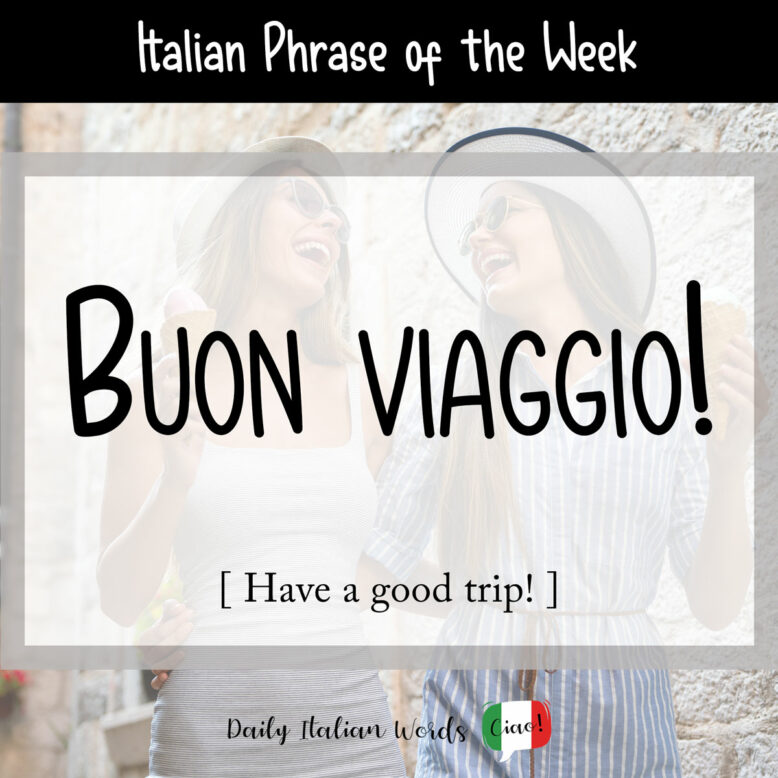
Literally translating as good journey or good trip , it greatly resembles the French expression with which we are all familiar: Bon voyage!
Buon viaggio, Alice! Ci vediamo tra una settimana!
Have a good trip, Alice! See you in a week!
In English, it’s common to express well-wishes for someone’s journey with phrases like “ Have a good trip! ” or “ Have a safe trip! ” However, in Italian, there’s no requirement to include a verb or specifically mention the person’s safety.

Unlike the English word trip , which can encompasses both the journey from point A to point B and the activities carried out at the destination, the word viaggio refers specifically to the journey.
In order to make an exact reference to the time spent at the location, it is better to opt for a different phrase: Buone vacanze! ( Have a good vacation! ) It can also be used when saying goodbye to someone (such as a classmate) at the beginning of the summer holidays and the end of the scholastic year.
Buone vacanze, Stefano. Ci vediamo a Settembre!
Have a good vacation, Stefano. See you in September!
Heather Broster is a graduate with honours in linguistics from the University of Western Ontario. She is an aspiring polyglot, proficient in English and Italian, as well as Japanese, Welsh, and French to varying degrees of fluency. Originally from Toronto, Heather has resided in various countries, notably Italy for a period of six years. Her primary focus lies in the fields of language acquisition, education, and bilingual instruction.
Ethics statement: Below you will find affiliate links. If you buy something after clicking the link, we will receive a small commission. To know more about our ethics, you can visit our full disclosure page. Thank you!

Lingopie (affiliate link) is the Netflix of language learning application that uses real TV shows and movies to help you learn a new language. You can choose a show to watch based on your fluency level, and use the interactive subtitles to get instant translations to help you learn quickly.

Are you interested in improving your Italian in a fun and stress-free manner? Then we highly recommend Serena Capilli's short stories in Italian (affiliate link) , designed for beginners, advanced beginners, and lower intermediate learners (A1-B1 CEFR). These stories have been optimised for English speakers in search of a fun, laid-back learning experience! Read our full review here .
Leave a Comment Cancel reply
Save my name, email, and website in this browser for the next time I comment.
What’s Italian for “bon voyage”?
27th June 2023
Ever wondered what to say in Italian for “bon voyage”? Learn exactly how to wish someone a good trip in Italian, as well as other useful phrases for travelling.

Listen to the episode :
Imagine setting off for an exciting holiday - to Italy perhaps, to practise your Italian.
As you’re leaving, your friends and family might say bon voyage!
In English we borrow this French expression that literally means: “good trip”. But what’s Italian for bon voyage ?
Wait for it…
BUON VIAGGIO!
It’s remarkably similar to the French expression: bon ( buon ), voyage ( viaggio ).
In this post, you’ll learn how to use and pronounce buon viaggio like a native, and pick up a few more phrases that follow this structure, too.
When to use buon viaggio: Italian for “bon voyage”
I’m leaving for Italy!
Buon viaggio!
Gotta go, I’ve a plane to catch!
In a similar way to “bon voyage” you can use this word to wish someone well as they’re leaving to go on a trip. If someone says this to you, you can say grazie (thanks) in response.
How to pronounce buon viaggio
To pronounce buon viaggio just like the Italians do, there are a couple of common mistakes you should avoid.
Let’s start with buon. It sounds a bit like BWON. Not BON (like in the French “bon voyage”). You need to make a W sound with your lips after the B. Let’s give that a practise:
B-Wo… B-Wo… B-Wo… B-Won… B-Won… Bwon… Buon!
Alternatively, start with the number: “one”, and then add a “b” sound in front:
One… one… b-one… b-one… b-one… buon!
Then there’s viaggio. The trickiest parts are the two “i”s. The first one is like a Y sound: VYA.
Attenzione! It’s not “Via” as in “viaduct”.
To get this right, try saying “ya”, like the first part of “yak”, but without the “k”.
Yak… yak… ya… ya…
Then add a “V” sound to the beginning:
Vyak… vyak… vya… vya…
The second “i” is not pronounced. Instead it turns the “g” into a soft “j” sound, like the “j” in the name “Joe”. To say the last part, just say “Joe” but shorten the vowel sound. Not a long “oh” sound, but a short, sharp “o”.
Joe… joe… joe... jo’... jo’... gio… gio!
Finally, since there’s a double -gg- sound, remember to hold that consonant just a little longer. Really take your time with it, and enjoy the sound. Viaggggio.
You might find it helps to imagine a little pause between the two ggs: viag-gio
Let’s put it all together:
B-won vyag-gio… bwon vyag-gio… bwon vyag-gio… buon viaggio!
So, now you know how to say buon viaggio, let’s talk about how this phrase works. Once you understand the logic behind it, you can use it to say lots of different things in Italian!
How does this expression work?
When you think about the literal meaning, it could sound a little strange.
Buon - good
Viaggio - trip
If you didn’t say “bon voyage” in English, you’d have to say “have a good trip” - a whole sentence.
In Italian though, you don’t need those extra words. It works just like the English phrase “good luck!” You don’t need to say “have good luck”, it’s just “good luck”. In the same way, Italians just say buon viaggio. Good trip.
Perhaps you’ve also noticed that it’s buon and not buono. Normally, to say something is good, Italians say buono:
Il caffè è buono - The coffee is good.
But with this expression, buono changes to buon.
Buon viaggio! - Have a good trip!
When buono goes before the word, like in this expression, buono changes to buon.
Here are some more examples:
Buon lavoro - Have a good day at work (good work)
Buon sabato - Have a good Saturday (good saturday)
In this next section you’ll learn more phrases that work in a similar way.
Other phrases like buon viaggio
Once you understand how buon viaggio works, you’ll start hearing other expressions that work in a similar way all the time in Italian.
For example, when someone is leaving for a trip, in Italian you can also say:
Buone vacanze!
Here we have buone, rather than buon, because vacanze is plural in Italian. Can you guess what vacanze are literally? It closely resembles its English meaning: “vacation”.
Buone vacanze! - Have a good vacation!
Alternatively, if someone is going back home rather than setting off on their trip, then you can say:
Buon rientro!
That means “have a good trip back”, literally “good return”. You can see that the word rientro looks a bit like “re-entry”, if that helps you remember it.
What about another French expression we know in English? As you’re sitting down for dinner, you might hear someone say “bon appetit” - but how would Italians say this? Just like with “bon voyage”, it’s quite similar to the French:
Buon appetito!
Just remember when you wish someone a good meal in Italian to really pronounce the double “p”s of appetito: ap-petito.
Do you feel you’re getting the hang of these “ buon…” expressions? There are lots. On the subject of food, if your friend is about to go and eat or drink something, you could wish them:
Buon pranzo! - Have a nice lunch!
Buon caffè! - Have a nice coffee!
Buona cena! - Have a nice dinner!
Buona pizza! - Have a nice pizza!
Notice that in the last two, we say buona ending in -a because cena and pizza are feminine words.
After a meal, if you’re on holiday in Italy, and you’re going out for a stroll around town, Italians might say:
The meaning is “have a nice walk”, although literally a giro is a “turn”. Perhaps you can imagine the connection between making a “turn” and wandering around? You can enjoy un giro especially when you’re wandering around a city you don’t know so well.
Or if you’re tired out and off to bed for a rest, they might say:
Buon riposo!
The meaning is: “have a good rest”.
…and the list could go on. As you can probably tell, you can apply this structure to many words in Italian to wish someone well in any kind of situation, whether it’s a trip: buon viaggio, or a meal: buon appetito.
Now you know how to wish someone buon viaggio , as well as many other phrases. Not only that, you understand what it means, and hopefully how to get the pronunciation right too.
If you want to test your knowledge of what you’ve learned, then check out our quiz below.
Good luck! Buona fortuna!
What’s Italian for “bon voyage”: Review
Looking to refresh your memory? Here’s a quick summary of the main points you learned in this lesson:
The Italian for “bon voyage” is buon viaggio.
The first word is buon - which sounds like BWON, with a “W” sound after the “B” .
The second word is viaggio - here, watch out for the two “i” sounds.
- At the beginning ( via ), don’t say VIA, say VYA.
- At the end, ( gio ), don’t say JEE-OH, say JO - like the first part of the name “Joe”.
And remember to pause on the double G: viag-gio.
Finally, you learned some other phrases that work in a similar way:
- Buone vacanze (good holidays)
- Buon rientro (good return trip)
- Buon appetito (bon appetit - enjoy your meal)
Can you remember any others? Feel free to check back through the last section to see the rest, then head over to our quiz to test your memory!
Become a member (it's free!)
Learn to speak and understand Italian faster by joining the Joy of Languages Italian club ! When you sign up, you'll get:
- Mini Italian lessons + bonus materials delivered to your inbox.
- Access to the private Facebook group where you can practice chatting in Italian.
- Invites to free speaking workshops.
If you'd like to join us, click here to become a member of our Italian club.
Vocabulary: What’s Italian for “bon voyage” ?
buone vacanze = good holidays / have a good vacation buon pranzo = good lunch / have a nice lunch buona cena = good dinner / have a nice dinner buon caffè= good coffee / have a nice coffee buona pizza = good pizza / have a nice pizza buon giro = good walk / have a nice walk buon riposo = good rest / have a good rest arrivare = to arrive prima di = before cucinare = to cook mangiare = to eat partire = to leave buon viaggio = bon voyage / have a good trip buon appetito = bon appetit / enjoy your meal buon rientro = good return / have a good return trip
Quiz : What’s Italian for “bon voyage” ?
How much did you learn? Find out in the quiz!
Click here to take the quiz for this episode: What's Italian for "bon voyage"?
Flashcards: What’s Italian for “bon voyage” ?
Remember the vocabulary from this lesson by downloading the digital flashcards
Not sure how it works? Click here to watch the tutorial
Transcript: What’s Italian for “bon voyage” ?
Please note, this is not a word for word transcript.
K: Ciao a tutti e benvenuti! Hi everyone and welcome to “Learn Italian with Joy of Languages”. Before we get started, did you notice? We’re celebrating our 100th episode!
M: Sììììììì!!!!
K: Grazie a tutti! Thank you for learning Italian with us and supporting this podcast.
M: We hope you’ve learned a lot over the last 100 episodes, and we can’t wait for you to learn more in the next 100!
K: And we have a prize to celebrate. The doors to our online Italian school open this September
M: And we’re giving away a 4-month subscription to one lucky student!
K: To enter, all you need to do is join our online Italian school mailing list. To find out more about the online school and join our mailing list, click the link in the description, or go to courses.joyoflanguages.com/online-italian-school.
M: We’ll let the winner know on September 1st 2023. After a few months of learning Italian in our school, you’ll be ready for your next trip to Italy. And speaking of which, today, we’re talking about how to wish someone a nice trip.
K: In English, we sometimes use the French phrase, bon voyage. What’s bon voyage in Italian?
M: Buon viaggio (x 3)
K: So as you can hear, it’s quite similar to the French one. We have:
M: Buon
K: Which means “good”, and:
K: Which means “trip” or “journey”. But how exactly do we use it? Matteo goes to Naples quite a lot, and this is a typical phone conversation we might have when he’s due to come back that day. As you listen, can you spot the expression buon viaggio , or any others that sound similar?
K: A che ora arrivi?
M: Alle 8:00
K: Cucino qualcosa?
M: Nooooo, mangio un'altra pizza prima di partire.
K: Certo! Allora buon appetito. E buon viaggio!
K: At the end, you heard our expression buon viaggio. But what did the rest of the conversation mean? First, we’ll break it down word for word, then you’ll learn how to use and pronounce the phrase buon viaggio, just like Italians do.
I asked Matteo:
M: A che ora arrivi?
K: What time do you arrive? Literally:
arrivi ? - you arrive?
K: And he replied:
M: Alle 8:00 - at 8 o’clock.
K: And if you need some help telling the time in Italian, you can check out episode 31.
Next I asked:
M: Cucino qualcosa?
K: Shall I cook something? Literally:
Cucino - I cook
Qualcosa - something
K: An extra thing to notice here is how we often use the present tense to talk about the future in Italian:
K: I’ll cook, literally “I cook”. Matteo doesn’t seem very enthusiastic about this idea…
M: Noooo, mangio un’altra pizza prima di partire .
K: No, I’ll eat another pizza before leaving. Literally:
mangio - I eat
un’altra - another
pizza - pizza
prima di - before
partire - parting
K: To say “before doing something”, it’s
M: Prima di
K: You need that extra di in Italian that doesn’t appear in English. Before leaving:
M: Prima di partire
K: Notice how “leaving”, partire sounds a lot like “part”
M: Partire. Prima di partire.
K: Unbelievable. I offered to cook for Matteo, but he decided he’d prefer to have another pizza in Naples rather than face my cooking. Understandable really, I’d do the same.
M: Eh, sì.
K: In fact, I replied:
M: Certo!
K: Of course!
Allora - well
buon appetito - bon appetit, literally “good appetite”.
K: Here’s another French phrase we sometimes use in English: bon appetit. Which is like saying: “have a good meal”, or “enjoy your meal”. In Italian once again it’s:
M: Buon appetito
K: Notice how the double P sound is much longer in Italian.
M: ap-petito
K: You’ve got to really enjoy that P sound!
K: Here we see this structure with buon. In Italian, we don’t say “have a good meal” or “enjoy your meal”.
M: In Italian, it’s really simple. We just say “good”, buon!
K: So to say “have a good meal”, or “enjoy your meal”, we literally say “good appetite”
M: Buon appetito!
K: Finally I said:
M: E buon viaggio
K: And have a good journey
Buon - good
Viaggio - trip
K: Another structure with “buon”. To say have a good journey, or enjoy your journey, we literally say “good journey”:
M: Buon viaggio!
K: Let’s move onto pronunciation, because there are a couple of details to pay close attention to. First, there’s:
K: It sounds like there’s a W sound there:
M: B-www-on
K: Not like “bon” of the French “bon voyage”. In Italian, it’s:
K: To say this word correctly, try saying “one”, as in the number “one”:
K: And then add a B sound before it: B-one, b-one, b-one… then get fast… bb-one… b-one… b-one… buon, buon, buon!
M: Buon (x 3)
K: Then we had viaggio, which has two unusual “i” sounds. Viaggio is spelt: V - I - A - G - G - I - O. The first I, directly after “v” is like a “y”
K: Imagine you’re saying “yak”, as in the big hairy animal: “Yak”. Then cut the “k” off the end, “ya”, “ya”, then add a “v” sound to the beginning. Vya, Vya, Vya…
M: Vya (x 3)
K: The “v” kind of slides into the “a” sound. It doesn’t make two syllables, like “via”. It’s just “vya”.
M: Vya
K: The last part of the word is spelt G - I - O. This second “i” sound, after the “g”, actually isn’t pronounced. It just makes the “g” a soft “j” sound, like in the word job. In fact, to say the last part of viaggio, try saying the word “job”.Then remove the b. Job, job, job, jo, jo, jo.
K: Another common pronunciation mistake is to say Joe, with a long oh sound. In Italian, it’s gio.
M: gio.
K: The last common mistake is to pronounce the “i” and say JEE-OH. But actually it’s JO.
M: Giò (x 3)
K: Let’s try and say the whole word together: viaggio.
M: viaggio (x 3)
K: The last thing to bear in mind is the double “g” consonant. Just like the “p” of
M: appetito
K: You should linger on the “g” sound:
M: viag-gio
K: You can even think of it like a little pause in between the two g-g’s. That often helps.
M: viag-gio (x 3)
K: Let’s put it all together!
M: Buon viaggio (x3)
K: Perfect! Thanks Matteo, it’s always good to have you back, once you’ve had your fill of pizzas…
M: Ah, yes when someone’s coming back from holiday you can also say buon rientro
K: Like “good return”, literally.
M: Buon rientro (x 3)
K: There are actually loads of phrases that work just like buon viaggio. Do you remember the other one we heard today?
K: And now also: M: Buon rientro
K: You can learn more of these over on the blog, but first, let’s listen to the conversation one more time:
K: So, now you know how to say buon viaggio , as well as a few other phrases!
M: And it’s not just buon viaggio and buon appetito. You can use this kind of expression in many contexts in Italian.
K: If you’re curious to learn a few more of these expressions with buon, don’t miss our blog post on this topic. There, you’ll also see everything from this lesson written down, and get bonus materials, like vocabulary cards and a quiz. Head over to our website, joyoflanguages.com/italianpodcast and search for [episode 100].
M: Ah, and don’t forget the prize for our 100th episode!
K: Our online Italian school is opening in September, and you can find out more by going to courses.joyoflanguages.com/online-italian-school/ or clicking on the link in the description. And if you join our newsletter, you’ll also be in with a chance of winning a 4-month subscription, from September to December.
M - See you next time.
K - Or as we say in Italian.
Alla prossima!
Join our Italian club
To get mini lessons delivered to your inbox, access to the private Facebook group and invites to speaking workshops, click here to become a member.
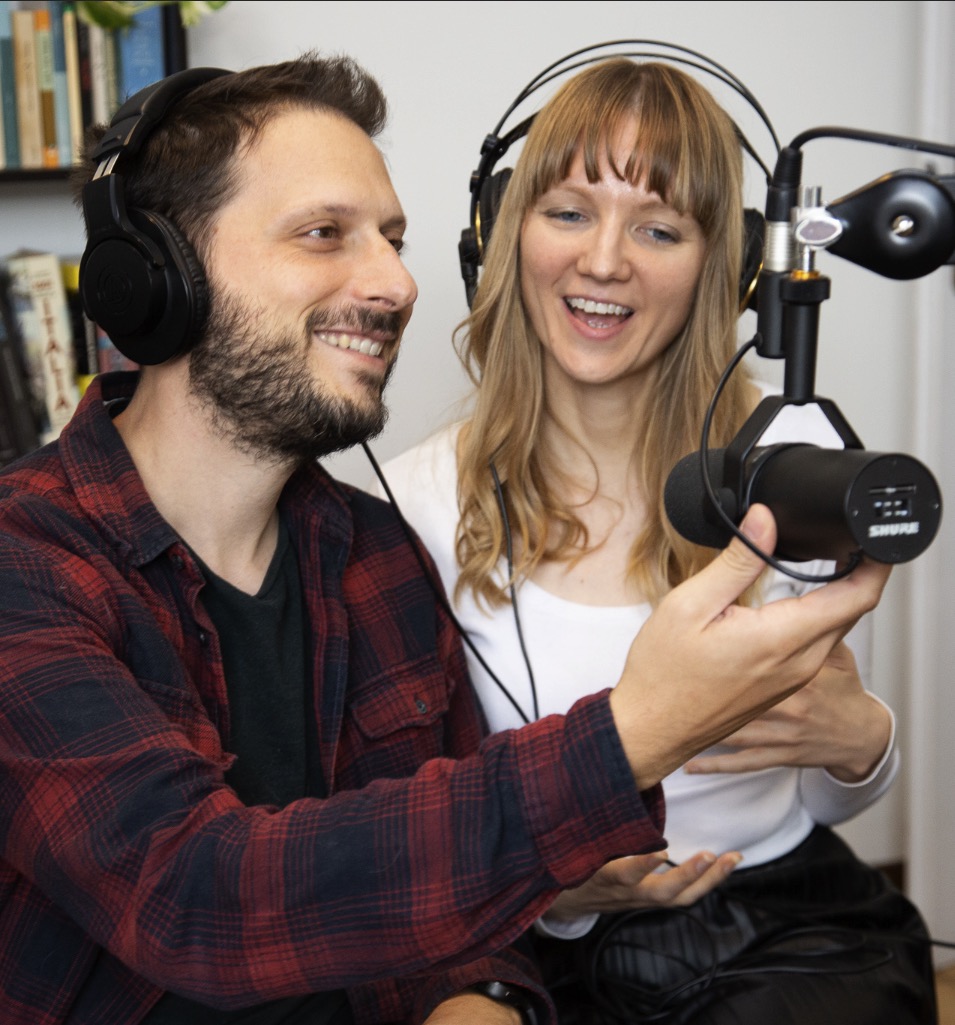
Mamma mia! You’ve signed up – but without our weekly free lesson
Our free weekly lesson is a great introduction to learning Italian in a fun and friendly way. No boring grammar or lists of random words. It’s all about real Italian conversation!
Be the first to hear when registration opens!
Plus! Also send me the free weekly lesson
Bellissimo!
How to Say Bon Voyage in Italian: A Comprehensive Guide
When it comes to bidding someone farewell on their journey, the phrase “bon voyage” comes to mind. In Italian, there are various ways to express this sentiment, depending on the level of formality and regional variations. In this guide, we’ll explore different ways to say “bon voyage” in Italian, highlighting formal and informal expressions, regional nuances, as well as providing useful tips and examples.
Formal Ways to Say Bon Voyage
If you are looking to convey your well-wishes in a formal setting or towards someone you are not intimately acquainted with, the following phrases are perfect:
“Buon viaggio!”
The phrase “Buon viaggio!” is the standard and most commonly used expression for saying “bon voyage” in Italian. It literally translates to “good journey” and is appropriate for all formal situations. It’s a versatile phrase that can be used for friends, acquaintances, colleagues, or even strangers.
“Auguri per il tuo viaggio!”
Translated as “Best wishes for your journey,” this is another formal way to say “bon voyage.” Use this phrase when you want to express your sincere wishes for a safe and successful trip to someone you respect or hold in high regard.
Informal Ways to Say Bon Voyage
When it comes to expressing your goodbyes in an informal setting, such as with close friends, family, or loved ones, the following phrases are more suitable:
Yes, you read it right! “Buon viaggio” is not only used formally but also commonly used in informal situations. Italians do not have a distinct phrase for informal “bon voyage.” Whether you’re bidding farewell to your best friend or your grandmother, “Buon viaggio!” will do the trick.
Regional Variations
Italian is a language rich in regional variations, and there are some unique expressions specific to certain areas. While the phrases mentioned above are understood throughout Italy, it’s always interesting to learn about these regional nuances:
“Bon viagh” (Piedmontese dialect)
In the Piedmont region, particularly in the dialect spoken there, locals often say “Bon viagh” to express “bon voyage.” It’s an endearing variation that adds a touch of regional charm to your message.
“Bon viagh e bon viagio!” (Sicilian dialect)
In Sicily, the Sicilian dialect offers its own twist on the phrase. Locals say “Bon viagh e bon viagio!” which elegantly combines both Italian and the Sicilian dialect for “bon voyage.” If you’re bidding farewell to someone with Sicilian roots, using this phrase will surely leave a lasting impression.
Tips and Examples
Here are a few tips and examples to help you navigate the usage of these phrases:
- Consider the relationship: When choosing between formal and informal expressions, consider your relationship with the person you’re bidding farewell to. Formal phrases are suitable for professional settings or people you are not intimately close to, while informal expressions are best reserved for loved ones or close friends.
- Personalize your message: Incorporate the person’s name or specific travel details to make your well-wishes more personal and heartfelt. For example, “Buon viaggio, Marco! Goditi la tua vacanza a Roma!” (Enjoy your trip to Rome!)
- Accompany with gestures: Italians are known for their expressive nature, so if you’re saying “buon viaggio” in person, consider adding a warm handshake, a hug, or a kiss on the cheek while conveying your wishes.
- Written communication: If you’re sending your wishes via a written medium like a card or an email, consider using a more elaborate expression like “Buon viaggio e che questa avventura possa lasciarti ricordi meravigliosi!” (Bon voyage, and may this adventure leave you with wonderful memories!)
Remember, the most important thing is to convey your genuine well-wishes and positivity towards the person embarking on their journey. No matter the specific phrase you use, your warm tone and sincerity will be greatly appreciated.
Now that you have learned how to say “bon voyage” in Italian, you are well-prepared to send off your friends, colleagues, or loved ones on their travels. Use these expressions, embrace the regional variations if necessary, and remember to add your personal touch to make it even more memorable. Buon viaggio!
Related Posts

How to Say Bon Voyage: Guide on Formal and Informal Ways to Wish Someone a Good Trip
Planning a journey or having a loved one embark on a trip can be an exciting time. As you bid them farewell and wish them a safe and enjoyable voyage, it's essential to convey your warm thoughts and well wishes. One popular phrase used to express this sentiment is "bon voyage." In this comprehensive guide, we will explore different ways to say "bon voyage," both formally and informally, to ensure you find the perfect way to send off your friends, family, or colleagues.
How to Say Bon Voyage in Arabic
When it comes to bidding farewell to someone embarking on a journey, expressing your well-wishes and saying "bon voyage" is a thoughtful gesture. If you find yourself in an Arabic-speaking country or connecting with Arabic-speaking individuals, it's helpful to know how to convey this sentiment in their language. In this guide, we will explore formal and informal ways to say "bon voyage" in Arabic, alongside some useful tips and examples.
How to Say "Bon Voyage" in Chinese
Saying "Bon Voyage" is a common way to wish someone a pleasant journey before they embark on a trip. In Chinese, there are various ways to express this sentiment, depending on the degree of formality and the region. In this guide, we will explore both the formal and informal ways to say "Bon Voyage" in Chinese. We will also provide tips and examples to help you grasp the nuances of these phrases for greater cultural understanding.
How to Say Bon Voyage in Croatian: Formal and Informal Ways, Tips, and Examples
If you're planning to wish someone a safe and pleasant journey in Croatian, the phrase "bon voyage" is a great choice. In Croatian, this phrase is translated as "sretan put" and is commonly used to bid farewell to loved ones who are embarking on a trip. Whether you're looking for a formal or informal way to express this sentiment, this guide will provide you with all the information you need, along with useful tips and examples.
Guide: How to Say "Bon Voyage" in Czech
When it comes to wishing someone a safe journey or saying "Bon Voyage" in Czech, there are a few ways you can express your warm wishes. In this guide, we will explore both the formal and informal ways to say "Bon Voyage" in Czech, along with some useful tips and examples. Whether you're planning to visit the beautiful Czech Republic or simply want to impress your Czech-speaking friends, this guide will provide you with the necessary knowledge to bid someone farewell in a warm and friendly manner.
How to Say Bon Voyage in Danish: A Comprehensive Guide
Are you planning to bid farewell to someone special in Danish? Knowing how to say "bon voyage" in the local language can add a thoughtful touch to your goodbye. In this guide, we will explore both formal and informal ways to express "bon voyage" in Danish, along with a few regional variations, if applicable. Whether you're off to explore the bustling streets of Copenhagen or bidding farewell to a Danish friend, we've got you covered. So, let's dive in!
How to Say Bon Voyage in Different Languages - A Comprehensive Guide
Embarking on a journey, whether it's a vacation or a business trip, is filled with excitement and anticipation. One way to bid farewell to someone on this thrilling adventure is by saying "bon voyage." However, if you want to add a touch of cultural flair to your goodbye, why not learn how to say "bon voyage" in different languages? In this guide, we'll explore formal and informal ways of bidding someone farewell, along with some regional variations. So, let's dive right into it!
How to Say "Bon Voyage" in Dutch
Whether you are bidding farewell to a loved one or wishing someone a pleasant journey, it's always thoughtful to say "bon voyage." If you find yourself in the Netherlands or interacting with Dutch speakers, it would be equally nice to know how to express this sentiment in Dutch. In this guide, we will explore both formal and informal ways to say "bon voyage" in Dutch, providing you with tips, examples, and even regional variations if necessary. So, without further ado, let's dive into the fascinating world of Dutch phrases!
Cancel reply
Save my name, email, and website in this browser for the next time I comment.
Arabic Cantonese Chinese Dutch English Farsi Filipino French German Greek Hawaiian Hebrew Hindi Irish Italian Japan Japanese Korean Latin Mandarin Mexican Navajo Norwegian Polish Portuguese Punjabi Romanian Russian Sanskrit Sign Language Spanish Swahili Swedish Tagalog Tamil Thai Turkish Ukrainian Urdu Vietnamese

- Privacy Policy
bottom_desktop desktop:[300x250]
To support our work, we invite you to accept cookies or to subscribe.
You have chosen not to accept cookies when visiting our site.
The content available on our site is the result of the daily efforts of our editors. They all work towards a single goal: to provide you with rich, high-quality content. All this is possible thanks to the income generated by advertising and subscriptions.
By giving your consent or subscribing, you are supporting the work of our editorial team and ensuring the long-term future of our site.
If you already have purchased a subscription, please log in
What is the translation of "buon viaggio" in English?
"buon viaggio" in english, buon viaggio {interj.}.
- volume_up enjoy your trip
- have a good trip
- have a nice trip
buon viaggio! {interj.}
- volume_up bon voyage!
Translations
Buon viaggio {interjection}.
- open_in_new Link to source
- warning Request revision
buon viaggio! {interjection}
Context sentences, italian english contextual examples of "buon viaggio" in english.
These sentences come from external sources and may not be accurate. bab.la is not responsible for their content.
Monolingual examples
Italian how to use "buon viaggio" in a sentence, italian how to use "enjoy your trip" in a sentence, italian how to use "have a good trip" in a sentence, italian how to use "have a nice trip" in a sentence, similar translations, similar translations for "buon viaggio" in english.
- peregrination
- subsistence
- smooth running
- good for you!
- good morning!
- buon pranzo!
- buon presentimento
- buon prezzo
- buon primo maggio
- buon pro gli faccia!
- buon sapore
- buon selvaggio
- buon viaggio
- buon vicinato
- buona a nulla
- buona annata
- buona caccia!
- buona donna
- buona educazione
- buona forchetta
- buona forma fisica
Even more translations in the English-Xhosa dictionary by bab.la.
Social Login

- Constructed scripts
- Multilingual Pages
Bon voyage / have a good journey in many languages
Jump to phrases
How to wish people a good or safe journey. The phrase, bon voyage, is used in English without change, though the pronunciation is quite like the French.
People who have contributed to this section
If you would like to make any corrections or additions to this page, or if you can provide recordings, please contact me .
http://www.nypl.org/branch/central/dlc/df/expressions/bonvoyage.html
Other phrases
Welcome | Hello | How are you? | Long time no see | What's your name? | Where are you from? | Pleased to meet you | Good morning | Good afternoon | Good evening | Good night | Goodbye | Good luck | Cheers! | Have a nice day | Have a nice weekend | Bon appetit | Bon voyage | Yes, No | Maybe | I don't know | Do you understand? | I understand | I don't understand | Please speak more slowly | Please say that again | Please write it down | Do you speak English? | Do you speak [your language]? | I'm learning [your language] | How do you say ... in [your language]? | Speak to me in [your language] | Excuse me | I would like ... | How much is this? | Sorry | Please | Thank you | Where's the toilet? | This gentleman/lady will pay for everything | Would you like to dance? | Do you come here often? | I miss you | I love you | Get well soon | Go away! | Leave me alone! | Help! | Fire! | Stop! | Call the police! | Merry Christmas | Happy New Year | Happy Easter | Happy Birthday | Congratulations | One language is never enough | My hovercraft is full of eels

728x90 (Best VPN)
Why not share this page:

If you like this site and find it useful, you can support it by making a donation via PayPal or Patreon , or by contributing in other ways . Omniglot is how I make my living.
Get a 30-day Free Trial of Amazon Prime (UK)
If you're looking for home or car insurance in the UK, why not try Policy Expert ?

- Learn languages quickly
- One-to-one Chinese lessons
- Learn languages with Varsity Tutors
- Green Web Hosting
- Daily bite-size stories in Mandarin
- EnglishScore Tutors
- English Like a Native
- Learn French Online
- Learn languages with MosaLingua
- Learn languages with Ling
- Find Visa information for all countries
- Writing systems
- Con-scripts
- Useful phrases
- Language learning
- Multilingual pages
- Advertising

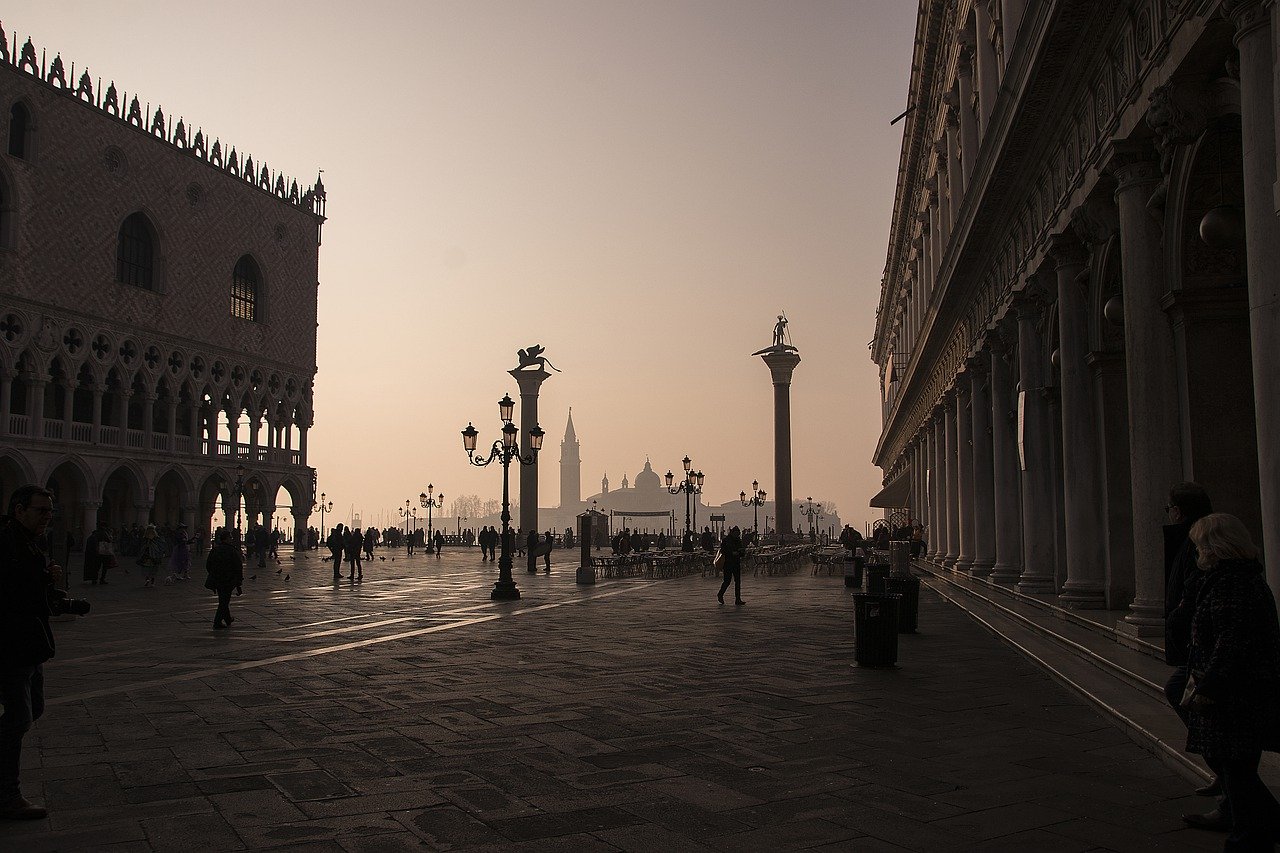
Buon viaggio! Have a Great Trip! Travel Phrases in Italian
- Post author: Language Garage
- Post published: August 11, 2020
- Post category: Italian / Travel / Vocabulary
Image by Ingeborg Gärtner-Grein from Pixabay .
In this post we’ll look at a lot of Italian vocabulary and expressions that will come in handy when you travel. Let’s start with the basics.
La mia valigia My Suitcase
Before you travel, you of course need to pack. So let’s start there.
- la valigia suitcase
- Devo fare la valigia. I need to pack my suitcase.
- La mia valigia è pesante / leggera / piena / vuota. My suitcase is heavy/light/full/empty.
- I miei vestiti non stanno nella mia valigia. My clothes don’t fit in my suitcase.
- Ho bisogno di un’altra borsa / valigia. I need another bag/suitcase.

All’aeroporto At the Airport
If you’re traveling, you’re probably going to leave from and arrive at an airport.
- il biglietto aereo, la carta d’imbarco, il passaporto, il volo plane ticket, boarding pass, passport, flight
- arrivi, partenze, l’uscita, il ritiro bagagli arrivals, departures, gate, baggage claim
- il controllo passaporti, la dogana passport control, customs
- Devo controllare i miei bagagli. I need to check my luggage.
- Ho un bagaglio a mano. I have a carry-on bag.
- Quando parte il volo? When does the flight leave?
- C’è una lunga fila alla sicurezza. There’s a long line at security.
- Ci imbarchiamo tra dieci minuti. We’re boarding in ten minutes.
- posto vicino al finestrino, posto corridoio, posto centrale window seat, aisle seat, middle seat
- pilota, assistente di volo pilot, flight attendant
- Per favore allacciate le cinture. Please fasten your seatbelt.
- Per favore, spegni il cellulare. Please turn off your cell phone.
- Quanto è lungo il volo? How long is the flight?
- Atterreremo tra dieci minuti. We’re landing in ten minutes.
- Dobbiamo passare attraverso la dogana e il controllo dei passaporti. We need to go through customs and passport control.
- Dov’è l’area ritiro bagagli? Where’s the baggage claim area?
- Dove sono i taxi? Where are the taxis?
- C’è un treno / autobus per la città? Is there a train/bus to the city?
- Ho bisogno di cambiare del denaro. I need to exchange money.
In hotel At the Hotel
You’ve finally arrived, so let’s get you settled in your hotel room.
- Dov’è l’hotel? Where is the hotel?
- Vorrei fare il check-in. I’d like to check in.
- Ho una prenotazione. Mi chiamo ______. I have a reservation. My name is ______.
- Dov’è l’ascensore? Where’s the elevator?
- A che piano si trova la mia stanza? What floor is my room on?
- la camera, il letto, il bagno, la finestra, la televisione, il telefono room, bed, bathroom, window, television, phone
- le lenzuola, la coperta, il cuscino, l’accappatoio sheets, blanket, pillow, bathrobe
- Avete il servizio in camera? Is there room service?
- Posso avere una coperta in più? Can I have an extra blanket?
- Posso avere un ferro e un’asse da stiro? Can I have an iron and an ironing board?
- Posso avere un asciugacapelli? Can I have a blow-dryer?
- Posso far lavare i miei vestiti? Can I have my clothes washed?
- Il riscaldamento non funziona. The heat isn’t working.
- L’aria condizionata non funziona. The air conditioning isn’t working.
- Per favore pulisci la mia stanza. Please clean my room.
- Posso avere un’altra stanza / una stanza più grande / una stanza più tranquilla? Can I have another room / a bigger room / a quieter room?
- Dove facciamo colazione? Where do we eat breakfast?
- C’è una palestra? Is there an exercise room?
- C’è una piscina? Is there a pool?

- C’è un bar? Is there a bar?
- C’è un ristorante? Is there a restaurant?
- Avete la WiFi? Do you have WiFi?
- Qual è la password per la WiFi? What’s the WiFi password?
- A che ora è il check-out? What time is check-out?
- A che ora devo liberare la stanza? What time do I need to vacate the room?
- Vorrei controllare. I would like to check out.
- Puoi chiamarmi un taxi? Can you call a taxi for me?
Ho fame. I’m hungry.
When you’re traveling, it’s important to know some basic terms for food, drink, and how to navigate a nice meal at a local restaurant. Check out this post , which covers all of that!
- Dove si trova la stazione ferroviaria? Where is the train station?
Once you’re settled into your hotel, you probably want to know where things are in case you need to pop out and buy something.
- C’è un minimarket nelle vicinanze? Is there a convenience store nearby?
- C’è una farmacia qui vicino? Is there a pharmacy nearby?
- C’è un supermercato nelle vicinanze? Is there a supermarket nearby?
- C’è un buon ristorante nelle vicinanze? Is there a good restaurant nearby?
- C’è un ospedale / uno studio medico nelle vicinanze? Is there a hospital/doctor’s office nearby?
- C’è una libreria nelle vicinanze? Is there a bookstore nearby?
- C’è un negozio di abbigliamento nelle vicinanze? Is there a clothing store nearby?
- C’è un negozio di scarpe nelle vicinanze? Is there a shoe store nearby?
- Dove si trova la stazione della metropolitana? Where is the subway station?
- Dov’è la stazione degli autobus? Where is the bus station?
- È vicino all’hotel. It’s next to the hotel.
Of course, if you ask where things are, you’ll need some basic vocabulary related to directions and getting around.
- È nelle vicinanze? Is it nearby?
- È lontano da qui? Is it far from here?
- Posso andarci a piedi? Can I walk there?
- È nelle vicinanze. It’s nearby.
- È lontano da qui. It’s far from here.
- È dall’altra parte della strada. It’s across the street.
- Attraversare la strada. Cross the street.
- Attraversare il ponte. Cross the bridge.
- Girare a destra. Turn right.
- Girare a sinistra. Turn left.
- Vai dritto. Go straight ahead.
- È vicino alla stazione dei treni. It’s next to the train station.
- È nelle vicinanze della stazione dei treni. It’s near the train station.
- È dietro la stazione dei treni. It’s behind the train station.
- È a sinistra della stazione dei treni. It’s the left of the train station.
- È a destra della stazione dei treni. It’s to the right of the train station.
- È di fronte alla stazione ferroviaria. It’s in front of the train station.
Andiamo a fare un giro turistico. Let’s go sightseeing.
- Vorremo fare un giro turistico. We would like to go sightseeing.
- Hai una mappa della città? Do you have a map of the city?
- C’è un bus turistico? Is there a tour bus?
- C’è una guida turistica? Is there a tour guide?
- Vorremo andare in un museo. We would like to go to a museum.
- Vorremo visitare una cattedrale / un tempio / una moschea. We would like to visit a cathedral/temple/mosque.
- Vorremo andare al parco. We would like to go to the park.
- Vorremo visitare una galleria d’arte. We would like to visit an art gallery.
- Vorremo vedere uno spettacolo teatrale / un’opera / un concerto. We would like to see a play/opera/concert.
- Vorremo visitare un castello. We would like to visit a castle.
- Vorremo visitare un monumento. We would like to visit a monument.
- Quali siti storici dovremmo visitare? Which historical sites should we visit?
- Quali siti culturali dovremmo visitare? Which cultural sites should we visit?
- Qual è il miglior quartiere per lo shopping? Where’s the best neighborhood for shopping?
- Qual è il miglior quartiere per la vita notturna? Where’s the best neighborhood for nightlife?
- Vorremo andare in un bar / una discoteca. We would like to go to a bar/nightclub.
- Dove c’è una buona vista della città? Where is there a good view of the city?
- Vorremo visitare un mercato (all’aperto / di strada). We would like to visit a (an open air/street) market.
- C’è un bagno pubblico nelle vicinanze? Is there a public bathroom nearby?
- Dov’è il bagno? Where is the bathroom?
- Dov’è l’uscita / l’ingresso? Where is the exit/entrance?
- Quanto costa una visita? How much does a tour cost?
Dove va questo treno? Where does this train go?
You probably want to see some sights outside of the city, and for that you’ll need to get around.
- Vorremo andare a Firenze. We would like to go to Florence.
- Vorrei un biglietto dell’autobus / del treno per Firenze. I’d like a bus ticket/train ticket to Florence.
- Quanto costa un biglietto? How much does a ticket cost?
- Vorrei un biglietto di sola andata. I’d like a one-way ticket.
- Vorrei un biglietto di andata e ritorno. I’d like a round-trip ticket.
- Quando parte il treno / l’autobus? When does the train/bus leave?
- Quando arriva il treno / l’autobus? When does the train/bus arrive?
- Questo autobus / treno va a Firenze? Does this bus/train go to Florence?
- Quanto tempo ci vuole per andare a Firenze? How long does it take to go to Florence?
- Dove posso noleggiare una macchina? Where can I rent a car?
- Come posso raggiungere la spiaggia / le montagne / il parco nazionale? How can I get to the beach/mountains/national park?
- Quanto costa? How much does it cost?
When you’re traveling, you probably need to by all sorts of things. Let’s cover that vocabulary.
- Dove posso acquistare una mappa / una bottiglia d’acqua / una tazza di caffè? Where can I get a map/a bottle of water/a cup of coffee?
- Dove posso acquistare degli occhiali da sole / un’aspirina / una crema solare? Where can I get sunglasses/aspirin/sunscreen?
- Dove posso acquistare cartoline / souvenir? Where can I get postcards/souvenirs?
- Dove posso comprare qualcosa da mangiare / qualcosa da bere? Where can I buy something to eat/something to drink?
- Si prega di scrivere il prezzo. Please write the price.
- Posso pagare in contanti? Can I pay by cash?
- Posso pagare con la carta di credito? Can I pay by credit card?
- È troppo costoso. That’s too expensive.
- Hai qualcosa di meno costoso? Do you have something less expensive?
- Posso vederlo, per favore? Can I see that, please?
- Prendo questo / quello. I’ll take this/that.
- Posso provarlo? Can I try it on?

Do you want to learn Italian?
Check out our other posts on Italian language, culture, and more . And if you’re looking for convenient and affordable live Italian lessons with a real teacher, check out The Language Garage. Our lessons are given online in a virtual classroom, so it doesn’t matter where you live or work – we can come to you. And we have flexible options, with a free trial so that you can decide if there’s a fit. Check us out!
Please Share This Share this content
- Opens in a new window
You Might Also Like

Shule: School in Swahili
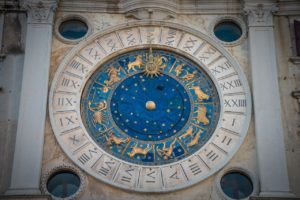
Che ore sono? What Time is It? Times, Days, and Dates in Italian

How’s Your Meal? Talking about Food in English
How to Say Bon voyage in Italian
- bombing campaign
- Bon appetit
- Are you employed?
- Are you unwell?
- Have a nice day
- I would like to cancel our reservation
- if I were you
- That's enough
- When is your birthday?
- Cambridge Dictionary +Plus
Translation of bon voyage – English-Italian dictionary
(Translation of bon voyage from the PASSWORD English-Italian Dictionary © 2014 K Dictionaries Ltd)

Word of the Day
veterinary surgeon
Your browser doesn't support HTML5 audio
formal for vet

Dead ringers and peas in pods (Talking about similarities, Part 2)

Learn more with +Plus
- Recent and Recommended {{#preferredDictionaries}} {{name}} {{/preferredDictionaries}}
- Definitions Clear explanations of natural written and spoken English English Learner’s Dictionary Essential British English Essential American English
- Grammar and thesaurus Usage explanations of natural written and spoken English Grammar Thesaurus
- Pronunciation British and American pronunciations with audio English Pronunciation
- English–Chinese (Simplified) Chinese (Simplified)–English
- English–Chinese (Traditional) Chinese (Traditional)–English
- English–Dutch Dutch–English
- English–French French–English
- English–German German–English
- English–Indonesian Indonesian–English
- English–Italian Italian–English
- English–Japanese Japanese–English
- English–Norwegian Norwegian–English
- English–Polish Polish–English
- English–Portuguese Portuguese–English
- English–Spanish Spanish–English
- English–Swedish Swedish–English
- Dictionary +Plus Word Lists
- PASSWORD English–Italian
- All translations
Add bon voyage to one of your lists below, or create a new one.
{{message}}
Something went wrong.
There was a problem sending your report.

How to Say Good Luck in Italian: 25 Sayings & Phrases
Today, we’ll delve into the fascinating world of Italian well-wishing expressions, exploring various ways to say “good luck” in Italian. These phrases play a significant role in Italian culture, helping to build connections and express heartfelt sentiments.
Whether you’re chatting with Italian friends or just want to familiarize yourself with Italian good luck sayings, understanding these common phrases will help you sound more like a native speaker.
From traditional Italian proverbs to unique Italian idioms, we’ll delve into the various ways to say “good luck” and “best wishes” in Italian and learn how to use these expressions in everyday life.
Good Luck in Italian: Common Expressions

In this section, we’ll introduce you to some common Italian sayings and expressions often used to wish someone good luck in Italian .
These phrases will help you sound more authentic when speaking with your Italian friends and give you a deeper understanding of Italian culture and mindset. So, let’s dive into these captivating expressions and learn how to use them in everyday conversations.
In bocca al lupo
This popular Italian phrase, which translates to “ in the mouth of the wolf ,” is often used to wish someone good luck. It is the English equivalent of the expression “Break a leg.”
The expression “ In bocca al lupo ” (literal translation “in the wolf’s mouth) is said to have originated from a hunting tradition where hunters would tell each other to “go into the mouth of the wolf” to show courage and fearlessness. In this context, you can use “in bocca al lupo” to encourage someone facing a challenge.
Here are a couple of example sentences in Italian with English translations.
Domani ho un esame importante, spero di passarlo. Tomorrow, I have an important exam; I hope I pass. Response: In bocca al lupo! (Break a leg!)
Mi sono iscritto a una maratona per beneficenza. I signed up for a charity marathon. Response: In bocca al lupo! (Break a leg!)
When someone wishes you “in bocca al lupo,” the common answer is “ crepi il lupo ” (may the wolf die), signifying that you’ll conquer the challenge before you.
Buona fortuna
“Buona fortuna” directly translates to “good fortune” in English. It is the Italian equivalent of the English expression “ Good luck .” “Buona fortuna” is a more general phrase than “in bocca al lupo” and can be used in various situations where you wish someone good luck.
Domani partecipo a un concorso di cucina. Tomorrow, I’m participating in a cooking competition. Response: Buona fortuna! (Good luck!)
Curious about how Italians carry their luck? Discover the allure of the Italian horn, the Cornicello , and its charming legacy.
In culo alla balena
Another Italian expression for good luck is “in culo alla balena,” which means “ in the whale’s backside .” Although it might sound strange, it’s a light-hearted and informal way to wish someone well. When using this expression, it’s common for the recipient to respond with “speriamo che non caghi” (let’s hope it doesn’t poop).
However, please be aware that both of these expressions are very informal and should not be used in any formal situation or when interacting with people who are not familiar.
Mi esibisco in un concerto stasera. I’m performing in a concert tonight. Response: In culo alla balena! (Good luck!) Possible reply: Speriamo che non caghi. (Let’s hope it doesn’t poop.)
Italian Sayings and Expressions for “Best Wishes”

Tanti auguri
“Tanti auguri” means “ many wishes ” or “ best wishes ” in English and is a versatile phrase used for various occasions, such as birthdays and anniversaries. You can also use it to wish someone success in their endeavors.
Oggi è il mio compleanno. Today is my birthday. Response: Tanti auguri! (Best wishes!)
Note: Another common expression to wish someone a happy birthday in Italian is “ buon compleanno .” “Tanti auguri” and “buon compleanno” can be used interchangeably when wishing someone a happy birthday, so feel free to use the one that resonates most with you.
Buon viaggio
This phrase ( bon voyage in Italian ) translates to “(have a) good trip ” and is used to wish someone a pleasant journey when they embark on a trip.
Parto per il mio viaggio in Giappone domani. I’m leaving for my trip to Japan tomorrow. Response: Buon viaggio! (Have a good trip!)
Buon lavoro
“Buon lavoro” means “ good work ” in English and is used to wish someone a productive and successful day at work.
Oggi ho una riunione importante al lavoro. Today, I have an important meeting at work. Response: Buon lavoro! (Have a good workday!)
Note: The Italian word “ buon ” (from the adjective “ buono “) and “ buona ” (female of buono) can be applied to many different situations to wish someone well. These expressions are commonly used in Italian to convey positive wishes in various contexts. Some examples include:
- Buon proseguimento: Enjoy the rest of your day/activity
- Buon appetito: Enjoy your meal
- Buon Natale: Merry Christmas
- Buona Pasqua: Happy Easter
- Buona giornata: Have a good day
- Buona serata: Have a good evening
- Buona notte: Have a good night
- Buona permanenza: Enjoy your stay
These phrases demonstrate the versatility of the words “buon” and “buona” in Italian, allowing you to easily convey your best wishes in various situations.
Grazie, tante belle cose
This expression, which means “thank you, (I wish you) many beautiful things,” is a warm and heartfelt way to wish someone well in any situation. It’s often used as a farewell or to wish someone happiness and success.
Spero che il tuo nuovo lavoro sia fantastico! I hope your new job is fantastic! Response: Grazie, tante belle cose! (Thank you, I wish you many beautiful things!)
Che Dio ce la mandi buona
This phrase translates to “may God send us something good” and expresses hope for a positive outcome .
Speriamo che il tempo migliori per il nostro picnic. Let’s hope the weather improves for our picnic. Response: Che Dio ce la mandi buona! (Let’s hope for the best!)
Auguri e figli maschi
This traditional expression, which means “best wishes and male children,” originates from when having male children was seen as a sign of prosperity and strength for a family.
Although the sentiment is outdated today, it is still used as a lighthearted and affectionate way to wish someone well, especially during weddings or when a baby is born.
Mia sorella si sposa domani. My sister is getting married tomorrow. Response: Auguri e figli maschi! (I wish you well!)
Incrociamo le dita
This phrase, “let’s cross our fingers,” is similar to the English expression “Fingers crossed” and expresses hope for a positive outcome.
Spero di ottenere quel lavoro! I hope I get that job! Response: Incrociamo le dita! (Fingers crossed!)
Tocchiamo ferro!
“Tocchiamo ferro!” means “touch iron!” in English and is similar to the English expression “knock on wood.” It’s used when you want to avoid tempting fate or to prevent bad luck.
Spero che non piova durante la nostra escursione. I hope it doesn’t rain during our hike. Response: Tocchiamo ferro! (Let’s touch iron!)
“Coraggio!” translates to “courage!” and is used to encourage and support someone facing a challenge or a difficult situation.
Ho paura di fare il discorso davanti a tutti. I’m scared to give a speech in front of everyone. Response: Coraggio! (Courage, you can do it!)
Spero che tutto vada bene
This phrase means “I hope everything goes well” and expresses your good wishes for someone in any situation.
Domani vado dal dottore per un controllo. Tomorrow, I’m going to the doctor for a check-up. Response: Spero che tutto vada bene. (Let’s hope everything goes well.)
Ti auguro il meglio
“Ti auguro il meglio” translates to “I wish you the best” and is a sincere way to express your best wishes for someone’s success and happiness.
Grazie per tutto, mi trasferisco in un’altra città. Thank you for everything; I’m moving to another city. Response: Ti auguro il meglio! (I wish you the best!)
Vedrai che andra’ tutto bene
This phrase, which means “you’ll see, everything will be fine,” is used to reassure and comfort someone worried or anxious.
Sono nervoso per l’esame di domani. I’m nervous about tomorrow’s exam. Response: Vedrai che andra’ tutto bene. (You’ll see, everything will be fine.)
Dai che ce la fai
“Dai che ce la fai” means “come on, you can do it” in English and is used to encourage and motivate someone to face a challenge or overcome a difficult situation.
Non so se posso completare questa maratona. I don’t know if I can complete this marathon. Response: Dai che ce la fai! (Come on, you can do it!)
Vai alla grande
“Vai alla grande” translates to “go big” and is used to wish someone success and greatness in their endeavors.
Ho deciso di aprire il mio ristorante. I decided to open my own restaurant. Response: Vai alla grande! (Go big!)
Using Italian “Good Luck” Sayings in Daily Life

Incorporating these phrases into your daily conversations will deepen your understanding of Italian culture and build stronger connections with Italian speakers.
Using these well-wishing expressions not only helps you embrace the Italian way of life, but also allows you to connect with others on a more personal and emotional level.
As you practice these phrases and become more comfortable with them, you’ll find that your conversations become warmer and more meaningful.
Importance of Language Learning in Understanding Italian Culture
Language is the gateway to understanding a culture and its people. By learning these well-wishing expressions and other aspects of the Italian language, you’re immersing yourself in the heart and soul of Italy.
As you expand your knowledge of the Italian language , you’ll discover even more fascinating aspects of Italian culture.
Well-wishing expressions play an essential role in Italian culture, allowing people to convey their heartfelt sentiments and wish for success, happiness, and well-being.
Learning and using these phrases will enrich your understanding of Italian culture and form deeper connections with Italian speakers.
We hope you’ve enjoyed this journey through the world of Italian well-wishing expressions. We encourage you to continue exploring the Italian language and lifestyle through “The Italian Way of Life” website. In bocca al lupo!
Recommended Reading:
- Top 15 Italian Superstitions: Italy’s Beliefs Revealed
- 37 Essential Italian Slang Words & Expressions
- How to Say Cheers in Italian: 21 Best Ways (w. Audio)
Say Hello in Italian: 21 Ways to Greet in Italy Like a Local
Similar posts.

How to Say Yes in Italian: Best 41 Ways (w. Audio)

Say Delicious in Italian: 16 Best Phrases for Foodies
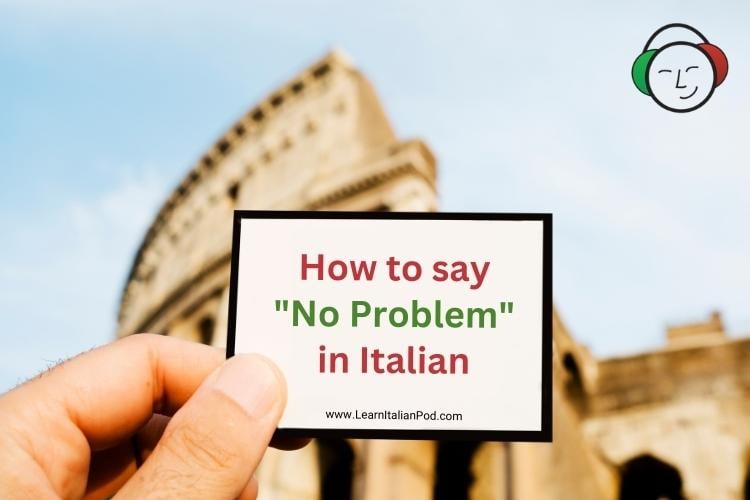
How to Say No Problem in Italian: 7 Ways with Audio

What Bellissima Means in Italian and How to Say It
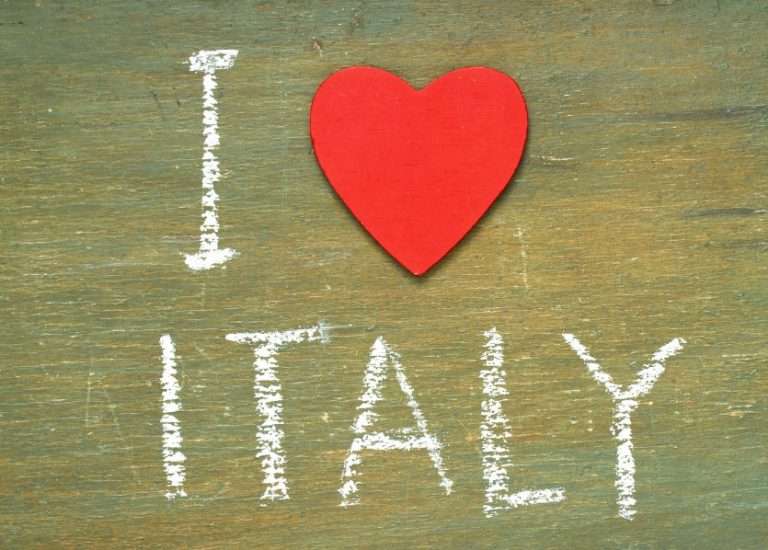
How to Say I Love You in Italian: Express Your Amore!


IMAGES
VIDEO
COMMENTS
Learn the meaning, pronunciation and usage of buon viaggio, the Italian equivalent of bon voyage. Find out how to say it in different situations, such as wishes, commands, or expressions of good wishes. Also, discover other ways to use the word buon and a song about bon voyage in Italian.
Learn how to say Have a good trip! in Italian with the expression Buon viaggio!, which resembles the French Bon voyage! Find out the difference between viaggio and vacanze, and how to use them in different contexts.
Learn the direct translation of 'Bon Voyage' in Italian and how to use it in different contexts and situations. Find out other ways to wish a good trip, express well-being and farewell in Italian.
If you're looking to express your well wishes in a more formal manner, you can use the following phrases: "Buon viaggio" - This is the most common and widely used phrase to wish someone a good trip in Italian. It translates directly to "good trip" and is appropriate for both formal and informal situations. "Ti auguro un buon ...
Learn the Italian expression for bon voyage, buon viaggio, and how to pronounce it like a native. Discover other phrases that follow the same pattern, such as buon appetito, buone vacanze, and buon rientro.
Learn how to say "bon voyage!" in Italian with the translation "buon viaggio!" and the definition of an interjection. See examples of usage and similar translations for "bon voyage!" in Italian.
Formal Ways to Say Bon Voyage. If you are looking to convey your well-wishes in a formal setting or towards someone you are not intimately acquainted with, the following phrases are perfect: "Buon viaggio!" The phrase "Buon viaggio!" is the standard and most commonly used expression for saying "bon voyage" in Italian.
Ha en underbar semester i italien. Collaborative Dictionary French-Italian. faire bon voyage. exp. fare buon viaggio. souhaiter bon voyage|bonne route à qn. exp. augurare buon viaggio a qn.
Learn how to say bon voyage in Italian with the translation of the phrase "have a good journey" from the PASSWORD English-Italian Dictionary. See the definition, pronunciation, and examples of bon voyage in the Cambridge English-Italian Dictionary.
bon voyage adv. E bon voyage al suo piccolo folletto. Courage, mon brave, And bon voyage to her little leprechaun. Manca solo la foto di bon voyage, e poi saremo pronti a salpare, gente. Let's just get one bon voyage photo, and then we're ready to shove off, folks. See how "bon voyage " is translated from Italian to English with more ...
Learn how to say bon voyage in Italian with examples of usage and synonyms. Find out the meaning of buon viaggio and other related expressions in Italian and English.
Translation of "bon voyage" into Italian. buon viaggio is the translation of "bon voyage" into Italian. Sample translated sentence: If that's all you've got to say, then bon voyage! ↔ Se non hai piu'nulla da dire, ti auguro buon viaggio. bon voyage interjection noun grammar. Used to wish someone a good journey.
Learn the Italian translation of the French phrase "bon voyage", which means "have a good trip". Find more words related to voyage, travel, and good in both languages.
Learn how to say "buon viaggio" in English with different expressions and examples. Find out the pronunciation, synonyms, and usage of this common Italian expression. Compare with "bon voyage" and other similar translations.
The phrase, bon voyage, is used in English without change, though the pronunciation is quite like the French. Veilige reis! Voorspoedige reis! تروح و تيجي بالسّلامة! (tirooh wa tigi bis salaama!) Ondo ibili! Добрай дарогi! (Dobraj darohi!) Mwende bwino!
La ringrazio molto per la vostra visita e buon viaggio! Vous faîtes une très bonne chose, alors bon voyage. Stai facendo una cosa molto buona, quindi - buon viaggio. Alors je te souhaite bon voyage. Allora ti auguro un buon viaggio. J'aurais aimé que tu me souhaites un bon voyage, c'est tout.
Many translated example sentences containing "bon voyage" - Italian-English dictionary and search engine for Italian translations.
In this post we'll look at a lot of Italian vocabulary and expressions that will come in handy when you travel. Let's start with the basics. La mia valigia My Suitcase. Before you travel, you of course need to pack. So let's start there. la valigia suitcase; Devo fare la valigia.
Bon voyage in Italian: What's Italian for Bon voyage? If you want to know how to say Bon voyage in Italian, you will find the translation here. You can also listen to audio pronunciation to learn how to pronounce Bon voyage in Italian and how to read it. We hope this will help you to understand Italian better.
Translation of "bon voyage" in Italian. So much to do before your big bon voyage party. C'è tanto da fare prima della tua festa di bon voyage. I look forward to personally seeing you off... and wishing you bon voyage. Sono personalmente impaziente di vedervi andar via e di auguravi bon voyage.
bon voyage translations: buon viaggio. Learn more in the Cambridge English-Italian Dictionary.
Faccia buon viaggio! Safe travels! (polite) Faccia buon viaggio, dottore! Have a safe journey, doctor! This wish uses the third person singular conjugated form. Basically, Italians address each other formally with the subject "you", lei. And that's the end of our lesson on how to say safe travels in Italian in all its forms!
In bocca al lupo. This popular Italian phrase, which translates to " in the mouth of the wolf ," is often used to wish someone good luck. It is the English equivalent of the expression "Break a leg.". The expression " In bocca al lupo " (literal translation "in the wolf's mouth) is said to have originated from a hunting ...